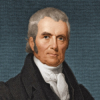John Marshall

John Marshall
John Marshallwas the fourth Chief Justice of the Supreme Court of the United States. His court opinions helped lay the basis for United States constitutional law and many say made the Supreme Court of the United States a coequal branch of government along with the legislative and executive branches. Previously, Marshall had been a leader of the Federalist Party in Virginia and served in the United States House of Representatives from 1799 to 1800. He was Secretary of State under...
NationalityAmerican
ProfessionJudge
Date of Birth24 September 1755
CountryUnited States of America
The particular phraseology of the Constitution of the United States confirms and strengthens the principle, supposed to be essential to all written constitutions, that a law repugnant to the Constitution is void; and that courts, as well as other departments, are bound by that instrument.
The Constitution is colorblind, and neither knows nor tolerates classes among citizens.
I suspect that 280 figure is a bit low. The reality is it's probably closer to 700 to 1,000 (students) out of the 911 units. But if they get a lot of empty nesters and up-and-coming professionals to buy there, that number could be a lot lower.
The acme of judicial distinction means the ability to look a lawyer straight in the eyes for two hours and not hear a damned word he says.
The law does not expect a man to be prepared to defend every act of his life which may be suddenly and without notice alleged against him.
A legislative act contrary to the Constitution is not law.
To listen well is as powerful a means of communication and influence as to talk well
A corporation is an artificial being, invisible, intangible, and existing only in contemplation of law.
What are the maxims of Democracy? A strict observance of justice and public faith, and a steady adherence to virtue.
Our Constitution is color-blind, and neither knows nor tolerates classes among citizens. In respect of civil rights, all citizens are equal before the law. The humblest is the peer of the most powerful.
The government of the United States has been emphatically termed a government of laws, and not of men. It will certainly cease to deserve this high appellation, if the laws furnish no remedy for the violation of a vested legal right.
In a free government almost all other rights would become worthless if the government possessed power over the private fortune of every citizen.
The power to tax involves the power to destroy;...the power to destroy may defeat and render useless the power to create....
The constitution is either a superior paramount law, unchangeable by ordinary means, or it is on a level with ordinary legislative acts, alterable when the legislature shall please to alter it. It is emphatically the province and duty of the judicial department to say what the law is. This is the very essence of judicial duty.